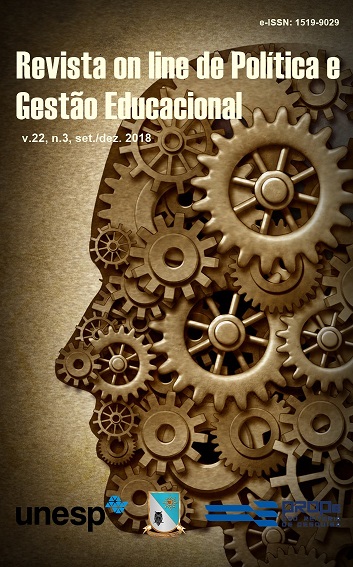The use of the game starring in the children’s education
DOI:
https://doi.org/10.22633/rpge.v22i3.11511Keywords:
Gameplay starring, Higher psychological functions, Child education, Teaching practicAbstract
The theory of the game is proposed by Elkonin (2009) and consists of explaining the main activity performed by pre-school children: the representation of the social roles that children assume while playing. For Elkonin (2009), these representations help the child in incorporating social norms, but also collaborates for an effective development of students' psychic functions. This theory also brings the need for teacher intervention in the process of playing the game. Therefore, considering the relevance of this activity in the educational process of preschoolers, the objective of the research is to verify the teachers' perception of the protagonist game and its accomplishment in the pedagogical practice in children's education classes. The research was qualitative-quantitative, carried out through a semi-structured questionnaire containing six objective questions with space for argumentation.Downloads
References
BARDIN, L. Análise de conteúdo. Tradução de Luís Antero Reto, Augusto Pinheiro. São Paulo: Edições 70, 2016.
BRASIL. Ministério da Educação. Secretaria de Educação Fundamental. Referencial curricular nacional para a educação infantil. Brasília: MEC/SEF, 1998.
DUARTE, N. Os conteúdos escolares e a ressurreição dos mortos: contribuição à teoria histórico-crítica do currículo. Campinas, SP: Autores Associados, 2016.
ELKONIN, D. B. Psicologia do jogo. Tradução de Álvaro Cabral. 2. ed. São Paulo: Editora WMF Martins Fontes, 2009.
FRANCISCO, L. S. O papel da atividade lúdica no desenvolvimento infantil: contribuições de Elkonin. TCC – Trabalho de Conclusão de Curso, Curso de Pedagogia, Universidade Estadual de Maringá, Maringá, 2011. Disponível em: http://www.dfe.uem.br/TCC/Trabalhos%202011/Turma%2032/Larissa_Francisco.pdf. Acesso em: 10 jan. 2018.
LEONTIEV, A. N. Uma Contribuição à Teoria do Desenvolvimento da Psique Infantil. In: VIGOTSKI, L. S.; LURIA, A. R; LEONTIEV, A. N. Linguagem, desenvolvimento e aprendizagem. 11. ed. São Paulo: Ícone, 2006, cap. 4, p. 59-83.
MARCOLINO, S.; BARROS, F. C. O. M.; MELLO, S. A. A teoria do jogo de Elkonin e a educação infantil. Revista Quadrimestral da Associação Brasileira de Psicologia Escolar e Educacional, SP, vol. 18, n. 1, 2014, p. 97-104. Disponível em: http://www.scielo.br/pdf/pee/v18n1/v18n1a10.pdf. Acesso em: 05 jun. 2018.
MARTINS, L. M. O desenvolvimento do psiquismo e a educação escolar: contribuições à luz da psicologia histórico-cultural e da pedagogia histórico-crítica. Campinas, SP: Autores Associados, 2013.
OTTONI, T. M. E; SFORNI, M. S. F. O brincar na educação infantil: explorando o jogo protagonizado. Congresso Nacional de Psicologia Escolar e Educacional, 2011, Maringá. Universidade Estadual de Maringá, 2011. Disponível em: http://www.abrapee.psc.br/xconpe/trabalhos/1/157.pdf. Acesso em: 10 mar. 2018.
PASQUALINI, J. C. O papel do professor e do ensino na educação infantil: a perspectiva de Vigotski, Leontiev e Elkonin. In.: MARTINS, L. M; DUARTE, N. (orgs.) Formação de professores: limites contemporâneos e alternativas necessárias [online]. São Paulo: Editora Unesp; São Paulo: Cultura Acadêmica, 2010. Disponível em: http://books.scielo.org/id/ysnm8/pdf/martins-9788579831034-10.pdf. Acesso em: 10 mar. 2018.
VIGOTSKY, L. S. Obras escogidas. Tomo II. Madrid: Visor, 2001.











